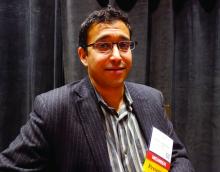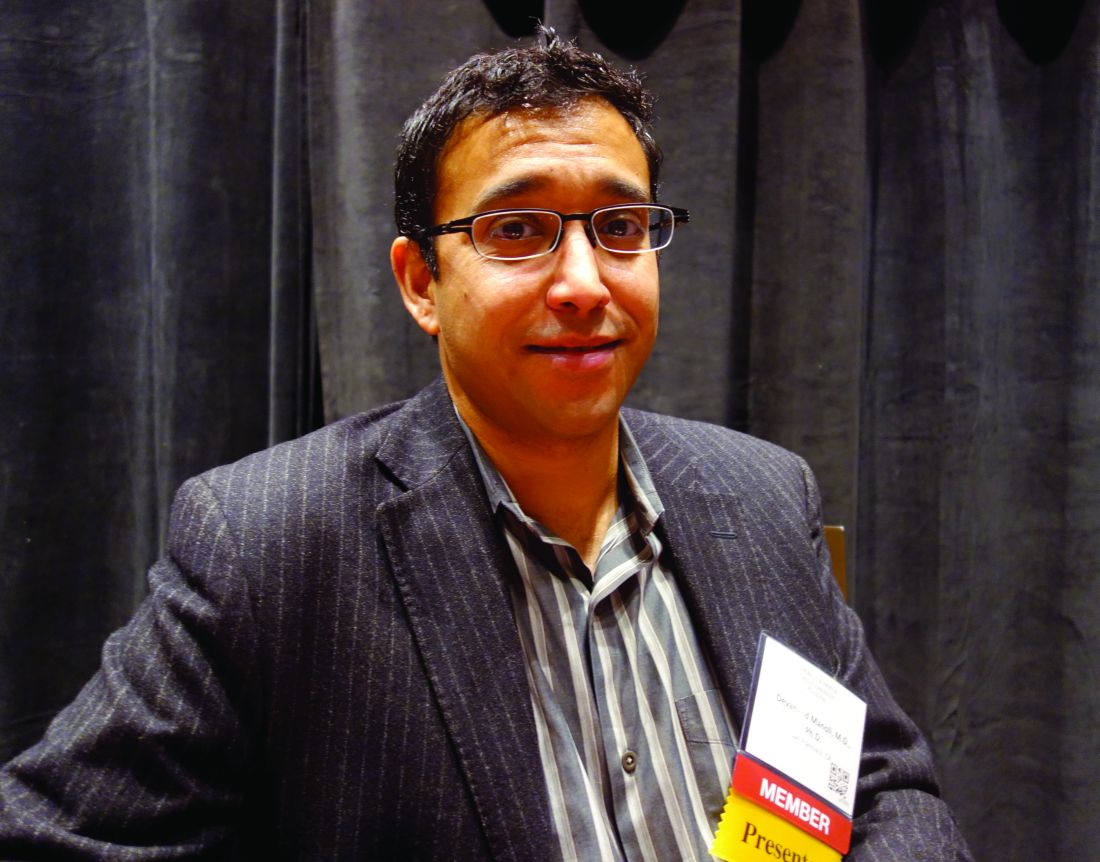User login
SAN FRANCISCO – Early detection and treatment of psychotic illness is critical in children, according to Devanand Manoli, MD, PhD, of the University of California, San Francisco.
“After the conversion to psychotic illness, one of the most important prognostic factors is the duration of untreated psychosis.” A longer duration is associated with a greater symptom burden and lower functioning, which have “significant prognostic implications,” but sometimes treatment doesn’t come for a year or more. “There are many patients out there not receiving treatment,” the pediatric psychiatrist said at a psychopharmacology update held by the American Academy of Child and Adolescent Psychiatry.
The impact of early treatment raises the question of what to do with those who seem to be at risk, but don’t meet criteria for formal diagnosis.
It’s tough to be sure who exactly is at risk. Signs and symptoms can be nonspecific in adolescents, including disorganized communication, suspiciousness, verbal memory deficiencies, and decline in social functioning.
It’s even a tougher call in younger children. Most who exhibit psychotic or psychoticlike symptoms do not have a true psychotic disorder. Loose associations and illogical thinking are fairly common in early childhood, and preschool children can have transient tactile, visual, and other hallucinations that are benign. If there does seem to be a problem, metabolic issues are the most likely culprit before the age of 6 or so.
Again, comprehensive early intervention – including reducing environmental stressors – helps with functioning, symptoms, and other issues even before a formal diagnosis. However, antipsychotics do not decrease the rate of conversion to psychotic illness in truly high-risk children; their use is for symptom management, Dr. Manoli said.
It’s important adolescents avoid cannabis; it’s become clear in recent years that marijuana increases the risk of conversion to schizophrenia and the risk of relapse. “It’s a very important thing to emphasize. Cannabis use is something to counsel against,” he said.
Atypicals seem to be about equally effective, so their selection mostly comes down to side effects and cost. An exception might be clozapine. “It’s a medication we are very resistant to prescribe” because of the need for aggressive neutrophil monitoring and other issues, “but in patients with acute psychotic symptoms, it can be very effective” in both treatment-naïve and treatment-resistant children and help with aggression, he said, noting also that it’s important to remember children are more sensitive than adults to akathisia and other extrapyramidal symptoms with antipsychotics.
In response to audience questions, Dr. Manoli said there isn’t really a need to monitor for prolactin elevations with atypical antipsychotics unless there are symptoms, such as inappropriate breast tissue or lactation. In those cases, augmentation with aripiprazole can normalize levels.
He also noted that he and his colleagues do order baseline and follow-up ECGs when prescribing ziprasidone; prolonged QTc interval is a concern, regardless of family cardiac history.
Dr. Manoli reported research funding from the Brain & Behavior Research Foundation, the One Mind Institute, the National Institutes of Health, and other sources.
SAN FRANCISCO – Early detection and treatment of psychotic illness is critical in children, according to Devanand Manoli, MD, PhD, of the University of California, San Francisco.
“After the conversion to psychotic illness, one of the most important prognostic factors is the duration of untreated psychosis.” A longer duration is associated with a greater symptom burden and lower functioning, which have “significant prognostic implications,” but sometimes treatment doesn’t come for a year or more. “There are many patients out there not receiving treatment,” the pediatric psychiatrist said at a psychopharmacology update held by the American Academy of Child and Adolescent Psychiatry.
The impact of early treatment raises the question of what to do with those who seem to be at risk, but don’t meet criteria for formal diagnosis.
It’s tough to be sure who exactly is at risk. Signs and symptoms can be nonspecific in adolescents, including disorganized communication, suspiciousness, verbal memory deficiencies, and decline in social functioning.
It’s even a tougher call in younger children. Most who exhibit psychotic or psychoticlike symptoms do not have a true psychotic disorder. Loose associations and illogical thinking are fairly common in early childhood, and preschool children can have transient tactile, visual, and other hallucinations that are benign. If there does seem to be a problem, metabolic issues are the most likely culprit before the age of 6 or so.
Again, comprehensive early intervention – including reducing environmental stressors – helps with functioning, symptoms, and other issues even before a formal diagnosis. However, antipsychotics do not decrease the rate of conversion to psychotic illness in truly high-risk children; their use is for symptom management, Dr. Manoli said.
It’s important adolescents avoid cannabis; it’s become clear in recent years that marijuana increases the risk of conversion to schizophrenia and the risk of relapse. “It’s a very important thing to emphasize. Cannabis use is something to counsel against,” he said.
Atypicals seem to be about equally effective, so their selection mostly comes down to side effects and cost. An exception might be clozapine. “It’s a medication we are very resistant to prescribe” because of the need for aggressive neutrophil monitoring and other issues, “but in patients with acute psychotic symptoms, it can be very effective” in both treatment-naïve and treatment-resistant children and help with aggression, he said, noting also that it’s important to remember children are more sensitive than adults to akathisia and other extrapyramidal symptoms with antipsychotics.
In response to audience questions, Dr. Manoli said there isn’t really a need to monitor for prolactin elevations with atypical antipsychotics unless there are symptoms, such as inappropriate breast tissue or lactation. In those cases, augmentation with aripiprazole can normalize levels.
He also noted that he and his colleagues do order baseline and follow-up ECGs when prescribing ziprasidone; prolonged QTc interval is a concern, regardless of family cardiac history.
Dr. Manoli reported research funding from the Brain & Behavior Research Foundation, the One Mind Institute, the National Institutes of Health, and other sources.
SAN FRANCISCO – Early detection and treatment of psychotic illness is critical in children, according to Devanand Manoli, MD, PhD, of the University of California, San Francisco.
“After the conversion to psychotic illness, one of the most important prognostic factors is the duration of untreated psychosis.” A longer duration is associated with a greater symptom burden and lower functioning, which have “significant prognostic implications,” but sometimes treatment doesn’t come for a year or more. “There are many patients out there not receiving treatment,” the pediatric psychiatrist said at a psychopharmacology update held by the American Academy of Child and Adolescent Psychiatry.
The impact of early treatment raises the question of what to do with those who seem to be at risk, but don’t meet criteria for formal diagnosis.
It’s tough to be sure who exactly is at risk. Signs and symptoms can be nonspecific in adolescents, including disorganized communication, suspiciousness, verbal memory deficiencies, and decline in social functioning.
It’s even a tougher call in younger children. Most who exhibit psychotic or psychoticlike symptoms do not have a true psychotic disorder. Loose associations and illogical thinking are fairly common in early childhood, and preschool children can have transient tactile, visual, and other hallucinations that are benign. If there does seem to be a problem, metabolic issues are the most likely culprit before the age of 6 or so.
Again, comprehensive early intervention – including reducing environmental stressors – helps with functioning, symptoms, and other issues even before a formal diagnosis. However, antipsychotics do not decrease the rate of conversion to psychotic illness in truly high-risk children; their use is for symptom management, Dr. Manoli said.
It’s important adolescents avoid cannabis; it’s become clear in recent years that marijuana increases the risk of conversion to schizophrenia and the risk of relapse. “It’s a very important thing to emphasize. Cannabis use is something to counsel against,” he said.
Atypicals seem to be about equally effective, so their selection mostly comes down to side effects and cost. An exception might be clozapine. “It’s a medication we are very resistant to prescribe” because of the need for aggressive neutrophil monitoring and other issues, “but in patients with acute psychotic symptoms, it can be very effective” in both treatment-naïve and treatment-resistant children and help with aggression, he said, noting also that it’s important to remember children are more sensitive than adults to akathisia and other extrapyramidal symptoms with antipsychotics.
In response to audience questions, Dr. Manoli said there isn’t really a need to monitor for prolactin elevations with atypical antipsychotics unless there are symptoms, such as inappropriate breast tissue or lactation. In those cases, augmentation with aripiprazole can normalize levels.
He also noted that he and his colleagues do order baseline and follow-up ECGs when prescribing ziprasidone; prolonged QTc interval is a concern, regardless of family cardiac history.
Dr. Manoli reported research funding from the Brain & Behavior Research Foundation, the One Mind Institute, the National Institutes of Health, and other sources.
EXPERT ANALYSIS FROM THE PSYCHOPHARMACOLOGY UPDATE INSTITUTE

